By Ngozi Ekeoma
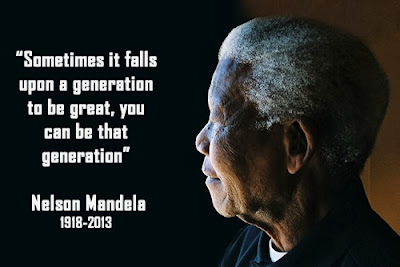
1. Courage is not the absence of fear
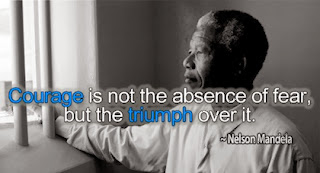 mandela courage by ngozi ekeoma“Mandela was often afraid during his time underground, during the Rivonia trial that led to his imprisonment, during his time on Robben Island. ‘Of course I was afraid!’ he would tell me later. It would have been irrational, he suggested, not to be. ‘I can’t pretend that I’m brave and that I can beat the whole world.’ But as a leader, you cannot let people know. ‘You must put up a front.’ And that’s precisely what he learned to do: pretend and, through the act of appearing fearless, inspire others. It was a pantomime Mandela perfected on Robben Island, where there was much to fear. Prisoners who were with him said watching Mandela walk across the courtyard, upright and proud, was enough to keep them going for days. He knew that he was a model for others, and that gave him the strength to triumph over his own fear.”
mandela courage by ngozi ekeoma“Mandela was often afraid during his time underground, during the Rivonia trial that led to his imprisonment, during his time on Robben Island. ‘Of course I was afraid!’ he would tell me later. It would have been irrational, he suggested, not to be. ‘I can’t pretend that I’m brave and that I can beat the whole world.’ But as a leader, you cannot let people know. ‘You must put up a front.’ And that’s precisely what he learned to do: pretend and, through the act of appearing fearless, inspire others. It was a pantomime Mandela perfected on Robben Island, where there was much to fear. Prisoners who were with him said watching Mandela walk across the courtyard, upright and proud, was enough to keep them going for days. He knew that he was a model for others, and that gave him the strength to triumph over his own fear.”2. Lead from the front — but don’t leave your base behind.
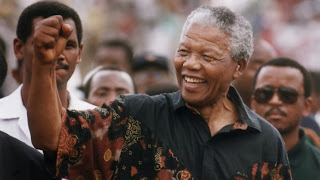 mandela leadership by ngozi ekeoma“For Mandela, refusing to negotiate was about tactics, not principles. Throughout his life, he has always made that distinction. His unwavering principle — the overthrow of apartheid and the achievement of one man, one vote — was immutable, but almost anything that helped him get to that goal he regarded as a tactic. He is the most pragmatic of idealists.”
mandela leadership by ngozi ekeoma“For Mandela, refusing to negotiate was about tactics, not principles. Throughout his life, he has always made that distinction. His unwavering principle — the overthrow of apartheid and the achievement of one man, one vote — was immutable, but almost anything that helped him get to that goal he regarded as a tactic. He is the most pragmatic of idealists.”3. Lead from the back — and let others believe they are in front.
 “Mandela loved to reminisce about his boyhood and his lazy afternoons herding cattle. ‘You know," he
“Mandela loved to reminisce about his boyhood and his lazy afternoons herding cattle. ‘You know," hemandela by ngozi ekeoma
would say, "you can only lead them from behind.’ He would then raise his eyebrows to make sure I got the analogy. As a boy, Mandela was greatly influenced by Jongintaba, the tribal king who raised him. When Jongintaba had meetings of his court, the men gathered in a circle, and only after all had spoken did the king begin to speak. The chief’s job, Mandela said, was not to tell people what to do but to form a consensus. "Don’t enter the debate too early," he used to say. … The trick of leadership is allowing yourself to be led too. ‘It is wise,’ he said, ‘to persuade people to do things and make them think it was their own idea.’”
4. Know your enemy — and learn about his favorite sport.
“As far back as the 1960s, mandela began studying Afrikaans, the language of the white South Africans who created apartheid. His comrades in the ANC teased him about it, but he wanted to understand the Afrikaner’s worldview; he knew that one day he would be fighting them or negotiating with them, and either
mandela and bill by ngozi ekeoma
way, his destiny was tied to theirs.”
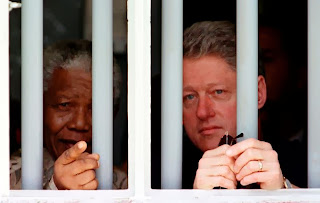
“Many of the guests mandela invited to the house he built in Qunu were people whom, he intimated to me, he did not wholly trust. He had them to dinner; he called to consult with them; he flattered them and gave them gifts. Mandela is a man of invincible charm — and he has often used that charm to even greater effect on his
keep your friends close mandela by ngozi ekeoma

appearance mandela by ngozi ekeoma
6. Appearances matter — and remember to smile.
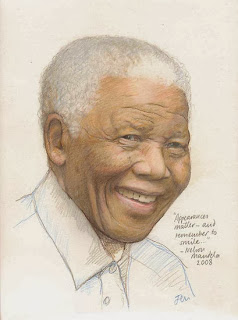
7. Nothing is black or white.
mandela by ngozi ekeoma nothing is black or white“Life is never either/or. Decisions are complex, and there are always competing factors. To look for simple explanations is the bias of the human brain, but it doesn’t correspond to reality. Nothing is ever as straightforward as it appears. Mandela is comfortable with contradiction. As a politician, he was a pragmatist who saw the world as infinitely nuanced. Much of this, I believe, came from living as a black man under an

8. Quitting is leading too.
“Knowing how to abandon a failed idea, task or relationship is often the most difficult kind of decision a leader has to make. In many ways, Mandela’s greatest legacy as President of South Africa is the way he chose to leave it. When he was elected in 1994, Mandela probably could have pressed to be President for life — and there were many who felt that in return for his years in prison, that was the least South Africa could do.…. ‘His job was to set the course,’ says Ramaphosa, ‘not to steer the ship.’ He knows that leaders lead as much by what they choose not to do as what they do.”
source:http://emodelz.blogspot.com/2013/12/leadership-lessons-from-nelson-mandela.html
| Posted: at | |



 TRENDING GISTS
TRENDING GISTS  Police Arrest 228 Suspects In Enugu
Police Arrest 228 Suspects In Enugu Fan Gushes As MC Oluomo’s Daughter Gets Engaged
Fan Gushes As MC Oluomo’s Daughter Gets Engaged VIDEO; "Davido Gifted My Girlfriend ₦10 Million For Supporting Me" - Rapper, Odumodublvck
VIDEO; "Davido Gifted My Girlfriend ₦10 Million For Supporting Me" - Rapper, Odumodublvck Mayor Of Boston Celebrates Nigerian Singer, Rema’s Role In Championing Afrobeat Worldwide
Mayor Of Boston Celebrates Nigerian Singer, Rema’s Role In Championing Afrobeat Worldwide PHOTOS: Troops Arrest Four Suspected Terrorists, Recover Arms And Ammunition In Taraba
PHOTOS: Troops Arrest Four Suspected Terrorists, Recover Arms And Ammunition In Taraba Labour Party Suspends Abia Governor Alex Otti, Five Others Over Alleged Anti-Party Activities
Labour Party Suspends Abia Governor Alex Otti, Five Others Over Alleged Anti-Party Activities